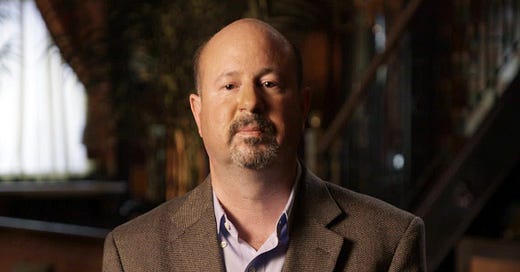Hello! Welcome to the first podcast of 2020! There’s no better guest to start the year with than the indefatigable Michael Mann, world renowned climate scientist from Penn State University. Michael’s spent the past month on a sabbatical in Australia, which has unfortunately meant that he’s seen the devastation of the wildfires in person. Climate change has had such an adverse effect on wildfires around the world, that there’s essentially no wildfire season anymore. In parts of Australia, they’re literally creating their own weather systems. Below is a post-game analysis of everything we discussed. Enjoy. 🧐

Dangerous Climate Change Is Here, Now
Michael couldn’t have picked a better, or worse, time to take a sabbatical in Sydney. On one hand, spending a month in a country that’s literally on fire isn’t ideal, but on the other, having Michael to testify and contextualize the damage first hand is a silver lining. As part of his research into the linkages between climate change and extreme weather events, Michael visited the Great Barrier Reef, the world's largest coral reef system, which will completely disappear within decades unless a dramatic reduction in global carbon emissions occurs. Michael also travelled to another of Australia’s natural wonders, the Blue Mountains, which is currently on fire and faces irreparable damage. The fires first started more than four months ago in September, and don’t show any sign of slowing.




Visualizing the Destruction Down Under
Unless you’ve seen a wildfire up close, it’s hard to imagine their severity. Thank the lord for the immense talent of the visual teams at The Guardian and the New York Times for contextualizing how bad the wildfires are.

The temperature in Sydney has regularly topped 100° Fahrenheit, including a handful of days of more than 110°…

Based on current data, this is likely to be Australia’s worst bout with wildfires on record.

And now we know just how dangerous it is to live in parts of Australia right now…

But not dangerous enough for the Australian Open tennis tournament to be postponed…
Australia’s Atrocious Climate Change Record
I’m sorry to do this, but the misery gets worse. Scott Morrison, Australia’s prime minister, is as terrible as they come when it involves climate change policy. Don’t be confused: Morrison’s Liberal Party are anything but liberal, and are weirdly the major right-wing party in Australia, whose climate change policies are utterly insufficient. According to the 2020 Climate Change Performance Index (page 9), Australia is 53rd of the 58 countries ranked, and rubs shoulders with the likes of Russia, Saudi Arabia and Iran. Spoiler alert: the U.S. is last, but we knew that, right?
It’s okay though, because Morrison insists his policies are adequate with no need for anyone to panic. No really, he actually said that. And that comes after he decided it would be fine to take a family vacation to Hawaii in the midst of his country burning to the ground. To be fair to the bloke, he did apologize for leaving his country when it needed him most, and compared his dilemma to a plumber deciding whether to accept a contract on a Friday afternoon. 🤷♂️
Please Like Me, Thanks
Before you read on, please like this edition of Inside The Newsroom by clicking the ❤️ below the title. That way I’ll appear in clever algorithms and more people will be able to read.
Celebrities Are Donating More Than Oil Companies
Prime minister Morrison announced a $2 billion Australian dollar ($1.4 USD) relief fund for victims, but this reactive measure isn’t anywhere near enough. Australia’s Climate Council said recently that the total damage from lost productivity may reach A$19 billion by 2030, A$211 billion by 2050 and an insane A$4 trillion by 2100, according to Bloomberg. So who’s left to make up the paltry help from the government? Celebrities.
Thanks to analysis from Emily Atkin — SUBSCRIBE TO HER NEWSLETTER — we know Nicole Kidman’s $250,000 donation equates to roughly $738 for the average American who makes $59,000. Compare that to Chevron’s $1 million donation, which equates to about $3.96 for the average American, based on the $15 billion Chevron made in 2018. And of course don’t forget Exxon Mobil…
Want more of Emily? We had an hourish chat on all things climate change.
👇
Dutch Supreme Court’s Landmark Ruling
Alas, you’ve made it to the end. For that, you shall be rewarded with some hope. On December 20, the supreme court in the Netherlands upheld a ruling ordering the country’s government had explicit duties to protect its citizens’ human rights because of climate change. The government must now reduce emissions by at least 25 percent compared with 1990 levels by the end of 2020. The landmark judgement had been in the courts for six years after the Dutch government fought the litigation at every stage.
David Boyd, the UN special rapporteur on human rights and the environment, said it was “the most important climate change court decision in the world so far,” which has already inspired similar lawsuits in Pakistan and New Zealand. According to this database created by the Grantham Research Institute on Climate Change and the Environment at the London School of Economics, there are currently 325 climate litigation cases in the courts around the world as we speak.
Isabella Kaminski, The Guardian
Climate Change Episodes…
#53 — Emily Atkin (Heated Newsletter)
#42 — Kait Parker (Weather.com)
#37 — Josh Morgerman (Hurricane Man)
#30 — Art Markman (University of Texas)
#23 — Michael Mann (Penn State University)
Next Week…
We’ll have Rachel Botsman on to talk about how people prefer to believe opinions over facts, and how the media begins to gain the trust of the public again.
Job Corner
Each week I’ll feature a selection of new journalism jobs. This week, I’ve listed a range of openings covering climate change.
Climate Nexus: Media Relations Intern
Inside Climate News: Climate Change Reporter
NPR: Supervising Editor, Climate
OCCRP: International Environment Editor
Quartz: Energy and Climate Change Reporter
Reuters: Climate Change Editor















Share this post